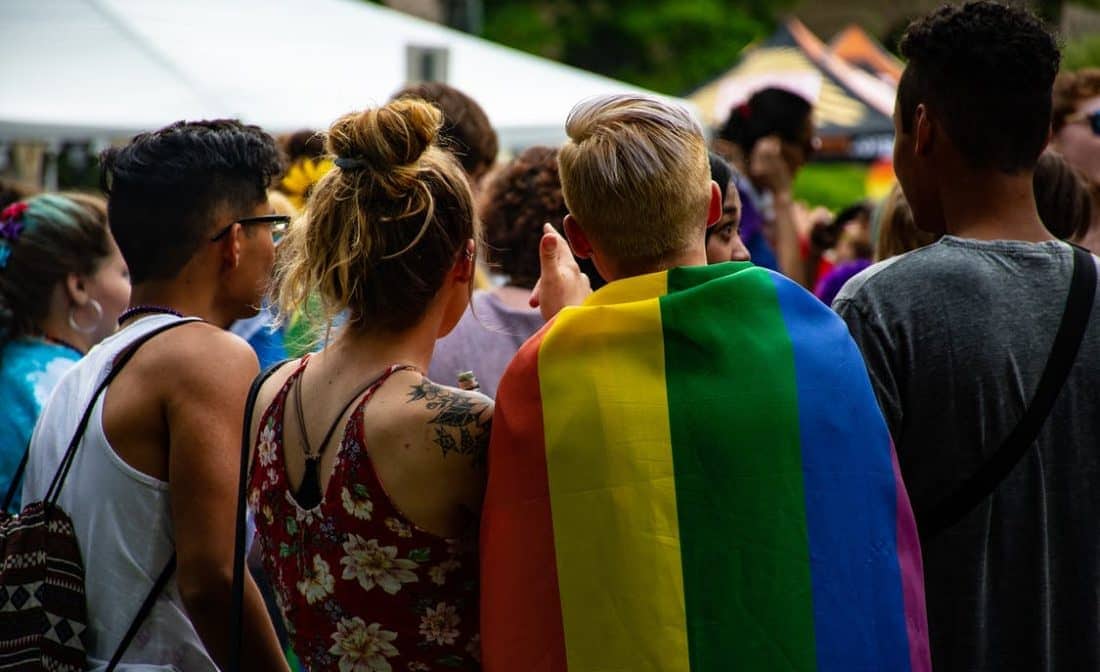What to Look For in an LGBTQ+-Friendly College
Note: This article contains brief mention of gender-based violence.
College is a formative time in a student’s life. You’ll learn not only to become a more independent adult, but also to explore your passions, goals, and identity. Every student deserves to attend a college that allows them to thrive as an individual preparing for the future. For most, that includes the availability of internships, hands-on experiences, and special interest organizations. But for LGBTQ+ students, that also includes some extra considerations that cisgender, heterosexual students don’t have to think about.
All students have a right to thrive with affirmative support and without shame. Discrimination and violence toward queer people (especially queer people of color) persist even after all the progress made since the Stonewall Uprising of 1969. That’s why we at Colleges of Distinction keep an eye out for the institutions that working to learn about and enact the policies that reduce harm for LGBTQ+ students on campus. From the administrative level to the way students interact with each other, there are a variety of ways in which colleges can support their queer students.
If you’re looking for a college with an LGBTQ+-friendly environment, try finding out whether your potential schools have any of the following resources listed below. Even if a couple of them don’t apply to your needs specifically, they show a school’s effort into fostering a positive environment for queer folks. Any combination of these will help you have the welcoming, supportive college experience that you deserve! And when you’re ready to start digging, the Equity & Inclusion Colleges of Distinction are an excellent place to start.
1. On-Campus LGBTQ+ Center
Where a school spends its money is a good indication of its priorities. Therefore, a dedicated, on-campus office/lounge for LGBTQ+ resources can be a positive sign of the administration’s values. After all, the maintenance of a physical space and the salary of its staff aren’t free!
In addition to an Office for Diversity, Equity, and Inclusion, an LGBTQ+ Center can be a great place at which to gather resources, find support, participate in advocacy and activism, and form friendships with other queer students and allies.
Similar offices that might exist on campus include “safe” or “brave” spaces. These are affirming areas in which students can do anything from hanging out and having lunch to engaging in tough conversations about their experiences.
Questions to ask: Is there a physical, on-campus space dedicated to LGBTQ+ inclusion and/or activism? How often is it open, and who can visit it?
2. Registered LGBTQ+ Student Organization(s)
Student organizations and clubs are among the best ways to feel connected to the campus community. A whole variety of clubs can exist on campus, each centered around a shared interest or identity. From intramural sports to knitting, there are likely some university-sponsored, student-led organizations centered around something you care about.
Clubs for queer students are quite common on college campuses, whether they be for activism or plain fun. Of course, any group of students can simply gather to hang out, but what’s key about registered student organizations is that the school itself officially recognizes and permits them. Look into the official student organizations listed on a school’s website (usually in a section called “Campus Life”).
If you see a club for queer students and allies, then that means that the school has approved and partially funded it. Alternatively, some schools discourage queer expression altogether and therefore do not sponsor groups dedicated to it.
Questions to ask: Are there any LGBTQ+ registered student organizations? Does the university promote them on its website? Do they interact with each other on social media?
3. LGBTQ+ Events
Year-round, there’s always a reason to celebrate, uplift, or remember. Multiple holidays and commemorations give us all an opportunity to get educated about and raise awareness for folks all along the queer spectrum, including National Black HIV/AIDS Awareness Day, International Trans Day of Visibility, LGBT History Month, and National Coming Out Day, to name a few.
Take a dive into schools’ social media accounts and events pages to see whether they participate in any kind of educational, service, or social events related to LGBTQ+ awareness. Let’s compare this kind of visibility to that of student-led organizations. Don’t get me wrong, student-led organizations are incredible safe havens for queer students; however, a lot of the heavy lifting is done by students themselves, not the administration. What’s encouraging about university-run events is that it requires staff to put in the work, taking a more active approach to inclusion.
4. Gender-Inclusive Housing/Gender-Neutral Bathrooms
Cisgender people (i.e., those who identify with the gender they were assigned at birth) often take for granted a number of privileges that trans, nonbinary, intersex, and other queer folks do not have. Even the most basic human necessities, like where to live and where to use the restroom, come with extra hurdles to anyone outside the gender binary.
Violence, surveillance, and other forms of discrimination are everyday threats that queer people typically look out for, as gender-based violence is overwhelmingly common in both public and private spaces. Colleges and universities can care for queer students’ physical safety and mental wellbeing through amenities that are mindful of inclusion.
Ask around to learn whether a school has prevalent gender-neutral/unisex restrooms throughout campus. Likewise, reach out to an admissions counselor to understand what housing options are available for trans and gender-nonconforming students. There is likely going to be an extra application process for anyone looking to participate in gender-inclusive housing, so take the time to understand what steps are necessary.
Questions to ask: Are students able to opt in to mixed-gender housing assignments? What is the process to sign up? Do first-year students have a different application process?
5. Queer Studies Majors, Minors, and/or Courses
Along with providing resources and support to queer students, schools demonstrate their acceptance by offering queer/gender studies courses. The field of gender studies is an intersectional mashup of different subjects, including anthropology, sociology, biology, history, and even economics. Such a broad and engaging discipline requires a sizable and skilled faculty, all of whom, of course, need a salary!
Questions to ask: Does the school have any courses related to gender studies? Can students earn a degree or minor in gender studies? Can students enroll in these courses regardless of major? Would these courses fulfill any general education requirements?
6. Campus Climate Surveys and Student Input
You might have heard some variation of the phrase “intent does not always equal impact.” That is, no matter how much a school intends to support its queer students, the only thing that actually matters is whether the students actually feel a real, positive impact on their experience. After all, what good is an LGBTQ+ Center if nobody knows it exists? Or worse, how can a student feel safe after a negative experience at the one place on campus that should be the most affirming?
Lots of schools conduct and publish “campus climate surveys,” or statistical analyses that gauge students’ opinions on the campus environment. This is a great way for schools (and anyone who has access) to determine which population of students feel the most and least satisfied with their everyday experience. If it is available, look into the campus climate survey to understand underrepresented students’ opinions about their engagement in class, their interactions with teachers, and how safe they feel on campus.
You can also reach out to students themselves, whether they be admissions ambassadors or family friends who attend a school you’re interested in. Try to get a feel for the average opinion that students have about a campus’s inclusion. Every institution, even outside of college, has so much room to grow in order to better serve underrepresented populations. Be mindful that perfection is not possible, but an upward trend of equity and inclusion shows that the administration is working hard to be a more welcoming space.
Questions to ask: Does the school have a published campus climate survey? Does the survey measure LGBTQ+ student input? Is there a noticeable gap between queer and non-queer folks? Are there specific action steps written to address any disparities?
7. Affirming Physical and Mental Healthcare
Queer and trans people have a famously strained relationship with physical and mental healthcare providers. Bias, discrimination, and a lack of comprehensive education can cause some providers to feel unprepared and under-qualified to treat queer bodies and minds. Students should have the safety net of a compassionate provider who understands their needs. Additionally, student health insurance policies should be comprehensive enough to address issues most common among the queer community.
Ongoing mental health counseling from queer- and trans-inclusive providers are a must; likewise, the student health insurance should include coverage of hormone replacement therapy. Altogether, these resources drastically improve queer students’ lives and experience through college. Look for a school that looks out for your needs!
Questions to ask: Are students offered a student health insurance policy? How many counseling sessions does it cover? Does the policy cover transition-related health services? Are the health services staff trained in caring for bodies that lie outside the gender binary? Is free and accessible HIV/STI testing provided through student health services?
You’re Just Getting Started
Everything mentioned above is just scratching the surface! Year after year, more schools are refining the ways in which they foster a healthier environment for their students and faculty. Your college experience is full of possibility. With a welcoming community, you will be able to grow not just as a student, but as a person with their own unique, fully realized identity.
Colleges of Distinction has started your college search for you! Our Equity & Inclusion recognition is awarded to schools based on the breadth of support they have for people of all underrepresented populations across gender identity, sexuality, race, ethnicity, socioeconomic status, and ability. Check out our list of pre-vetted schools so that you have a good place to start!




